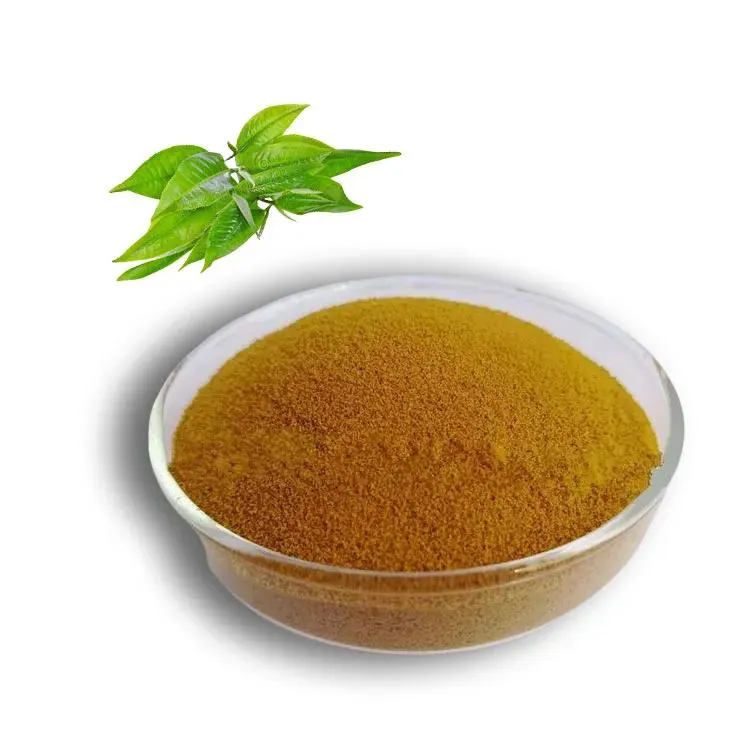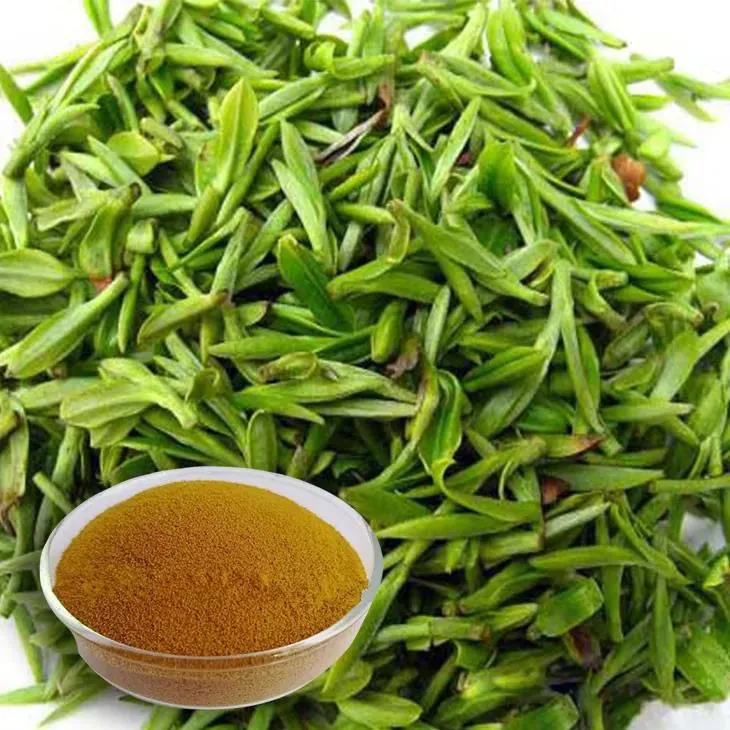- 0086-571-85302990
- sales@greenskybio.com
Green Tea Extract: Should You Use It for Skin Care?
2024-11-12

Introduction
Skincare has become an essential part of our daily routine, with a plethora of products and ingredients available in the market. Among these, Green Tea Extract has gained significant popularity in recent years. This article will delve into the various aspects of Green Tea Extract in skincare, including its antioxidant properties, anti - acne capabilities, and influence on skin hydration, to help you decide whether it should be a part of your skincare regimen.

What is Green Tea Extract?
Green tea extract is derived from the leaves of the Camellia sinensis plant. It contains a rich blend of bioactive compounds, such as polyphenols, flavonoids, and catechins. Catechins, in particular, are the most abundant and are responsible for many of the beneficial effects on the skin. The most well - known catechin in green tea is epigallocatechin - 3 - gallate (EGCG), which has been the subject of numerous scientific studies regarding its potential health and skincare benefits.

Green Tea Extract as an Antioxidant
How Antioxidants Work on the Skin
Our skin is constantly exposed to environmental stressors such as UV radiation, pollution, and free radicals. Free radicals are unstable molecules that can cause damage to skin cells, leading to premature aging, wrinkles, and a dull complexion. Antioxidants, like those found in green tea extract, work by neutralizing these free radicals. They donate an electron to the free radicals, thereby stabilizing them and preventing them from causing further harm to the skin cells.
The Role of EGCG in Antioxidant Activity
EGCG, as mentioned earlier, is a powerful antioxidant. It has been shown to be more effective than other antioxidants like vitamin C and E in some studies. It can penetrate the skin cells and protect them from both internal and external sources of oxidative stress. This protection is crucial for maintaining the health and integrity of the skin. For example, in vitro studies have demonstrated that EGCG can inhibit the formation of reactive oxygen species (ROS) in skin cells, which are major contributors to skin damage.

Anti - Acne Properties of Green Tea Extract
Anti - Inflammatory Effects
Acne is often associated with inflammation in the skin. Green tea extract has anti - inflammatory properties due to its polyphenol content. These polyphenols can reduce the production of inflammatory mediators in the skin, such as cytokines and prostaglandins. By doing so, they can help to calm inflamed skin and reduce the redness and swelling associated with acne. For instance, a study on acne - prone individuals showed that applying a green tea - based topical product led to a significant reduction in skin inflammation over a period of weeks.
Antibacterial Activity
Another factor contributing to acne is the presence of bacteria, particularly Propionibacterium acnes. Green tea extract has been found to have antibacterial properties against this bacterium. The catechins in green tea can disrupt the cell membrane of P. acnes, inhibiting its growth and survival. This dual action of reducing inflammation and combating bacteria makes green tea extract a potentially effective ingredient for treating and preventing acne.
Green Tea Extract and Skin Hydration
Enhancing the Skin Barrier
The skin barrier plays a vital role in maintaining skin hydration. Green tea extract can help to strengthen the skin barrier by promoting the production of ceramides, which are lipids that form an important part of the skin barrier. When the skin barrier is intact, it can prevent water loss from the skin, keeping it hydrated. In addition, green tea extract can also increase the expression of proteins involved in the skin's moisture - retaining mechanisms, such as filaggrin.
Moisturizing Effects
Some studies suggest that green tea extract may have direct moisturizing effects on the skin. It can attract and bind water molecules, providing an additional source of hydration. This can result in softer, smoother skin with a more youthful appearance. However, more research is needed to fully understand the extent of these moisturizing effects and how they compare to traditional moisturizing ingredients.
Pros of Using Green Tea Extract in Skincare
- Natural and Gentle: Green tea extract is a natural ingredient, making it a great option for those with sensitive skin or those who prefer natural skincare products. It is generally well - tolerated and has a lower risk of causing adverse reactions compared to some synthetic ingredients.
- Multiple Benefits: As we have seen, it offers antioxidant, anti - acne, and skin hydration benefits. This means that it can address multiple skin concerns simultaneously, simplifying your skincare routine.
- Anti - Aging Potential: By protecting the skin from free radicals and maintaining its health, green tea extract can contribute to a more youthful - looking skin. It may help to reduce the appearance of wrinkles and fine lines over time.
Cons of Using Green Tea Extract in Skincare
- Allergic Reactions: Although rare, some individuals may be allergic to green tea extract. It is always recommended to do a patch test before using a product containing it to avoid any allergic reactions.
- Concentration and Purity: The effectiveness of green tea extract in skincare products can vary depending on its concentration and purity. Some products may contain only a small amount of green tea extract, which may not provide the desired benefits. It is important to choose products with a high - quality and properly formulated green tea extract.
- Limited Efficacy for Severe Skin Conditions: While it can be beneficial for mild to moderate skin concerns, green tea extract may not be sufficient to treat severe acne, eczema, or other complex skin conditions on its own. In such cases, medical treatment may be required in addition to using skincare products containing green tea extract.
How to Incorporate Green Tea Extract into Your Skincare Regimen
- Cleansers: Look for cleansers that contain green tea extract. These can help to gently cleanse the skin while providing the antioxidant and anti - acne benefits of green tea.
- Toners: Green tea - based toners can be used after cleansing to further balance the skin's pH and provide additional hydration and antioxidant protection.
- Serums: Serums with a high concentration of green tea extract can be a great addition to your skincare routine. They can penetrate deeper into the skin and deliver a more potent dose of the beneficial compounds.
- Masks: Green tea masks are available in both sheet and clay forms. These can be used once or twice a week to give your skin an intensive treatment of green tea's goodness.
- Moisturizers: Some moisturizers also contain green tea extract. Using these can help to keep the skin hydrated while also providing the other benefits of green tea.
Conclusion
Green tea extract offers a range of potential benefits for the skin, including antioxidant protection, anti - acne properties, and skin hydration. While it has its pros and cons, it can be a valuable addition to many people's skincare regimens. However, it is important to be aware of the potential allergic reactions and to choose products with a high - quality green tea extract. By considering your own skin type and concerns, and following the proper incorporation methods, you can decide whether green tea extract is right for you in your skincare journey.
FAQ:
Q1: What makes green tea extract a powerful antioxidant for skin?
Green tea extract contains polyphenols, especially catechins like epigallocatechin - 3 - gallate (EGCG). These compounds have antioxidant properties. They can neutralize free radicals in the skin. Free radicals are unstable molecules that can damage skin cells, cause premature aging, and contribute to various skin problems. By scavenging these free radicals, green tea extract helps protect the skin cells from oxidative stress and damage.
Q2: How does green tea extract help with anti - acne?
Green tea extract has anti - inflammatory properties. Acne is often associated with inflammation in the skin. The polyphenols in green tea can reduce the inflammation in the sebaceous glands and hair follicles. Also, it has antibacterial effects that can target the bacteria, such as Propionibacterium acnes, which are involved in the development of acne. This dual action of reducing inflammation and fighting bacteria can help in preventing and treating acne.
Q3: Can green tea extract improve skin hydration?
Green tea extract can contribute to skin hydration. It helps strengthen the skin's barrier function. A healthy skin barrier is better able to retain moisture. The antioxidants in green tea also protect the skin cells that are involved in maintaining the skin's moisture balance. However, it may not be a standalone solution for extremely dry skin but can be a beneficial part of a comprehensive skincare routine for maintaining good skin hydration.
Q4: Are there any side effects of using green tea extract in skincare?
For most people, green tea extract is generally well - tolerated in skincare products. However, some individuals may experience mild irritation, especially those with very sensitive skin. It is advisable to do a patch test before using a product containing green tea extract widely on the face or body. In rare cases, allergic reactions may occur, but this is not common.
Q5: How should I incorporate green tea extract into my skincare routine?
You can incorporate green tea extract in various ways. Look for skincare products such as moisturizers, serums, or face masks that contain green tea extract. You can also make your own green tea - based skincare at home. For example, you can brew green tea, let it cool, and use it as a toner by applying it to the skin with a cotton pad. However, when making your own products, ensure proper hygiene and storage to avoid contamination.
Related literature
- The Role of Green Tea Extract in Skin Health"
- "Green Tea and Skin: Antioxidant, Anti - inflammatory, and Anti - aging Effects"
- "Beneficial Effects of Green Tea Extract on Acne - Prone Skin"
- ▶ Hesperidin
- ▶ Citrus Bioflavonoids
- ▶ Plant Extract
- ▶ lycopene
- ▶ Diosmin
- ▶ Grape seed extract
- ▶ Sea buckthorn Juice Powder
- ▶ Fruit Juice Powder
- ▶ Hops Extract
- ▶ Artichoke Extract
- ▶ Mushroom extract
- ▶ Astaxanthin
- ▶ Green Tea Extract
- ▶ Curcumin
- ▶ Horse Chestnut Extract
- ▶ Other Product
- ▶ Boswellia Serrata Extract
- ▶ Resveratrol
- ▶ Marigold Extract
- ▶ Grape Leaf Extract
- ▶ New Product
- ▶ Aminolevulinic acid
- ▶ Cranberry Extract
- ▶ Red Yeast Rice
- ▶ Red Wine Extract
-
Sophora Japonica Flower Extract
2024-11-12
-
Green coffee bean Extract
2024-11-12
-
Beetroot Powder
2024-11-12
-
White mustard seed extract
2024-11-12
-
American Ginseng Root Extract
2024-11-12
-
Hericium erinaceus extract powder
2024-11-12
-
Apricot Powder
2024-11-12
-
Phyllanthus Emblica Extract
2024-11-12
-
Sea buckthorn Juice Powder
2024-11-12
-
Curcuma Longa Extract
2024-11-12





















